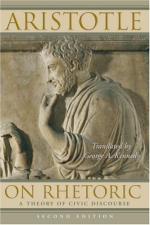
|
| Name: _________________________ | Period: ___________________ |
This test consists of 15 multiple choice questions and 5 short answer questions.
Multiple Choice Questions
1. In Aristotle's opinion, why were many people not swayed by sound arguments?
(a) They were too uneducated.
(b) They were not emotional enough.
(c) They were too educated.
(d) They were too emotional.
2. To object to an argument, whose authority did Aristotle think could be appealed to?
(a) A respected writer or judge.
(b) A well known writer or lawyer.
(c) A well known writer or judge.
(d) A respected writer or lawyer.
3. Following the example given in Book II, Chapter 24, what false assumption could be made by describing a large crowd?
(a) The people in the crowd must be large.
(b) The people in the crowd must be standing in a circle.
(c) The people in the crowd must be small.
(d) The people in the crowd must be standing in a line.
4. Why did Aristotle consider metaphors to be useful in Book III, Chapter 10?
(a) People connect with similar ideas.
(b) People connect with sensible ideas.
(c) People enjoy new ideas.
(d) People enjoy thoughtful ideas.
5. As both illustrations and fables utilized imagery to make a point, what type of imagery did Aristotle think fables used?
(a) Irrelevant.
(b) Fantastic.
(c) Realistic.
(d) Relevant.
6. As explained by Aristotle in Book II, Chapter 24, what else might a person equivocate?
(a) The use of words.
(b) The order of events.
(c) The meaning of words.
(d) The description of events.
7. As explained by Aristotle in Book II, Chapter 18, what was political argumentation concerned with?
(a) Neither past nor future events.
(b) Future events.
(c) Past events.
(d) Both past and future events.
8. Why was a refutative enthymeme considered to be more effective by Aristotle?
(a) It was more concise and less elegant.
(b) It was less concise and less elegant.
(c) It was less concise and more elegant.
(d) It was more concise and more elegant.
9. What was the basic method used in the a fortiori argument that Aristotle referred to in Book II, Chapter 23?
(a) To focus on several positions at once.
(b) To focus on only one position at a time.
(c) To argue two entirely different things at once.
(d) To prove one thing by proving another first.
10. Which one of the following was not included in Aristotle's recommendations for orators on how to write and speak their arguments?
(a) Abundance of detail.
(b) Convincing delivery.
(c) Eloquent style.
(d) Non-logical means.
11. What was thought to be incorrect about the example of the misuse of the epithet that Aristotle provided?
(a) An extraordinary adjective was applied to an ordinary noun.
(b) An ordinary adjective was applied to an extraordinary noun.
(c) An ordinary verb was applied to an extraordinary noun.
(d) An extraordinary verb was applied to an ordinary noun.
12. Which of the following examples best demonstrates Aristotle's theory of possibility in Book II, Chapter 19?
(a) Thunder and lightening.
(b) Snow and ice.
(c) Clouds and rain.
(d) Heat and sunshine.
13. As explained by Aristotle in Book III, Chapter 10, how should effective prose express its important points?
(a) With elegant, extravagant sayings.
(b) With succinct, elegant sayings.
(c) With succinct, extravagant sayings.
(d) With succinct, extravagant, elegant sayings.
14. In Aristotle's opinion, what did simple words convey?
(a) What people do not already know.
(b) What people do not want to know.
(c) What people already know.
(d) What people want to know.
15. According to Aristotle, how did people in their prime view success?
(a) It was not impossible.
(b) It was probable.
(c) It was not possible.
(d) It was not improbable.
Short Answer Questions
1. What was used in the example that argued the existence of a "non-animal" in Book II, Chapter 24?
2. According to Aristotle, what was epideictic rhetoric most likely to deal with?
3. According to Aristotle, what was the general difference between enthymemes and examples?
4. According to Aristotle, what should vivid descriptions always depict?
5. In Book II, Chapter 26, how many common errors did Aristotle discuss?
|
This section contains 660 words (approx. 3 pages at 300 words per page) |

|




